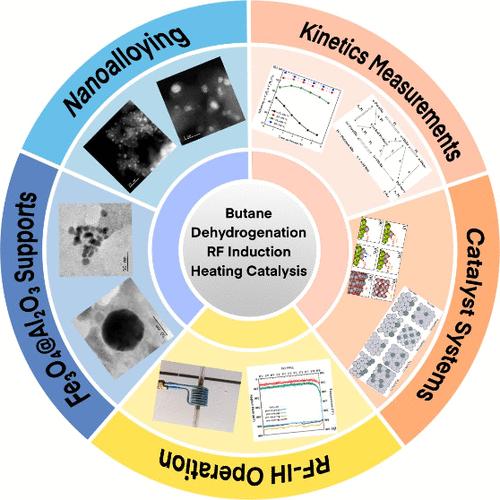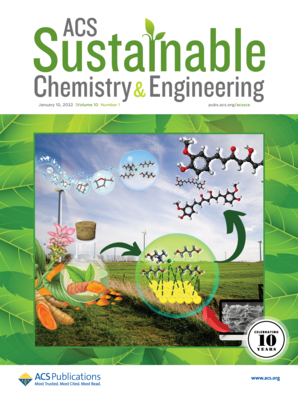IF 7.1
1区 化学
Q1 CHEMISTRY, MULTIDISCIPLINARY
引用次数: 0
摘要
由于页岩气资源丰富,生产商希望通过轻质烷烃的脱氢反应来满足对烯烃(尤其是正烯烃)日益增长的需求。虽然这些反应的催化剂已经研究了多年,但烯烃的选择性和失活仍然是具有挑战性的问题。为了解决这些问题,这项研究采用了局部间接加热方法(射频感应加热,RF-IH)来替代使用蒸汽或燃烧器(如天然气燃烧)的传统工艺加热方法。射频感应加热法已被应用于正丁烷脱氢为 C4 烯烃的过程,方法是利用基于铁/Fe3O4 易受磁场影响的催化剂。为了模拟典型的正丁烷脱氢催化剂,我们合成了以铂或钒为活性金属的磁芯壳催化剂。对于这些催化剂,与传统的热加热相比,射频-热操作显著提高了对烯烃的选择性,并减少了失活现象,尽管初始活性并不总是像热操作催化剂那样高。这些结果促使我们继续研究射频-高温的效果及其对某些异相催化过程的益处。本文章由计算机程序翻译,如有差异,请以英文原文为准。

Improved Performance of Catalysts Containing Pt, Pt–Sn, and V in the Dehydrogenation of n-Butane by Radio-Frequency Induction Heating
Due to an abundance of shale gas, manufacturers are interested in meeting increased demands for alkenes, especially n-alkenes, by the dehydrogenation of light alkanes. While the catalysts for these reactions have been studied for many years, alkene selectivity and deactivation remain challenging problems. This work addresses these problems by the substitution of a localized indirect heating method (radio-frequency induction heating, RF-IH) for more traditional process heating employing steam or burners (e.g., natural gas combustion). RF-IH has been applied to the dehydrogenation of n-butane to C4 alkenes by utilizing magnetically susceptible catalysts based on Fe/Fe3O4 susceptors. Magnetic core–shell catalysts with either Pt or V as active metals were synthesized to mimic typical n-butane dehydrogenation catalysts. For these catalysts, RF-IH operation resulted in significantly improved selectivity to alkenes and less deactivation when compared to conventional thermal heating, although the initial activities were not always as high as their thermally operated counterparts. These results provide motivation to continue investigating the effects of RF-IH and its benefits to certain heterogeneous catalytic processes.
求助全文
通过发布文献求助,成功后即可免费获取论文全文。
去求助
来源期刊

ACS Sustainable Chemistry & Engineering
CHEMISTRY, MULTIDISCIPLINARY-ENGINEERING, CHEMICAL
CiteScore
13.80
自引率
4.80%
发文量
1470
审稿时长
1.7 months
期刊介绍:
ACS Sustainable Chemistry & Engineering is a prestigious weekly peer-reviewed scientific journal published by the American Chemical Society. Dedicated to advancing the principles of green chemistry and green engineering, it covers a wide array of research topics including green chemistry, green engineering, biomass, alternative energy, and life cycle assessment.
The journal welcomes submissions in various formats, including Letters, Articles, Features, and Perspectives (Reviews), that address the challenges of sustainability in the chemical enterprise and contribute to the advancement of sustainable practices. Join us in shaping the future of sustainable chemistry and engineering.
 求助内容:
求助内容: 应助结果提醒方式:
应助结果提醒方式:


